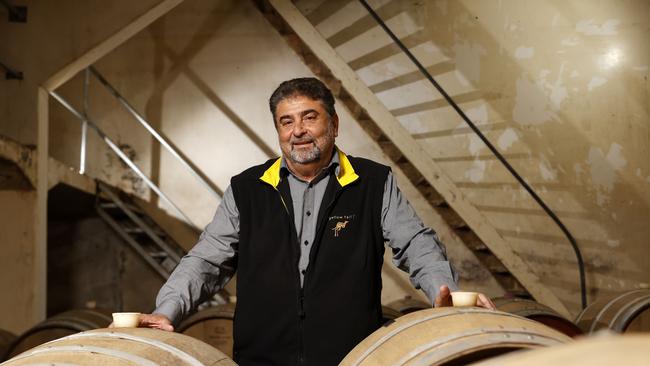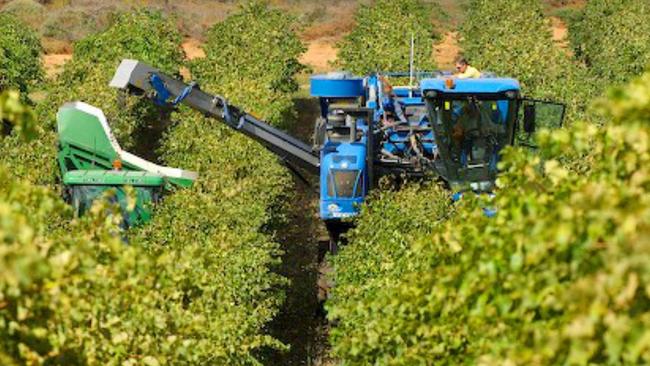Casella Wines boss says industry-wide approach to image is essential for jobs and survival
The wine industry needs to unify and take a leaf from the marketing pages of its beer peers that promote an image and lifestyle as much as the brand, says Casella boss John Casella.

The head of the nation’s largest family owned winemaker, Yellow Tail producer Casella Wines, is alarmed by the effect of declining wine consumption on the industry’s profitability and employment prospects.
And he wants winemakers nationwide to unite in a campaign which highlights the enjoyment of their product.
John Casella, whose juggernaut “cheap and cheerful” Yellow Tail label grew from a drawing board idea after the Sydney Olympics to become the most popular imported wine in the US, believes tens of thousands of jobs across regional and rural Australia are now at risk – along with the wine industry itself.
Mr Casella, who has declared a “call to arms” among winemakers, is impressed by how the beer industry not only markets individual brands but also promotes “fun and enjoyment” drinking beer with friends and family.
“What I would like to see is the industry band together to try to get consumers interested in wine again,” Mr Casella told The Australian.
“As a product it is natural, mainly family supplied, agricultural and regional, and it has got all the right qualities. We are not seeking for people to overconsume – they need to drink responsibly – but we need to promote the idea of wine.
“When you look at beer ads it is breweries advertising their own products, but they are not just promoting their own products they are actually promoting the product as well to consumers; so those beautiful beer ads are out in the outback or beach scenes.
“And I think the wine industry needs to just get together and encourage people to consume wine, to consume wine responsibly of course, but wine is such an important part of life and the enjoyment of life, food and friendship and the types of things that everybody strives for.”
Industry statistics show global wine consumption has fallen by 4 per cent over the past 10 years, and in Australia consumption is declining at an average annual rate of 1.8 per cent.

A number of economic and demographic factors have contributed to the steady decline in wine consumption.
Although China has reopened its borders to Australian wine after the dismantling of tariffs, that market is down as much as 50 per cent due to an economic downturn and younger consumers turning to other drinks. One factor is the perception of effects on health, causing younger drinkers to turn away from alcohol which has allowed other beverages to take a market share.
Falling demand for red wine is causing a problem for Australian winemakers which traditionally produce large volumes of it.
The higher cost of living for some and the nation’s economic issues have combined to create problems for Australia’s $45bn wine industry and Mr Casella believed that required a unified response.
“It is a difficult period for the wine sector,” Mr Casella said. “It’s a combination of factors. There’s an oversupply; we know that because it’s a declining market, which is very challenging.
“Different consumer trends – what they’re drinking, what was popular and what’s not so popular now – red wines are the challenge, because people are drinking lighter wines and trending towards white wines and this issue of consumers probably drinking less.”

Mr Casella said he was particularly concerned about the future of regional and rural jobs that the wine industry generated. It is estimated there are 2150 wineries and roughly 6000 grapegrowers employing just under 164,000 full and part-time employees across 65 regions in Australia, contributing more than $45bn annually to the economy.
Griffith-based Casella, founded by Maria Casella and her husband Filippo who migrated from Italy in 1957, has so far been able to weather the storm as it broadened its wine portfolio away from its flagship Yellow Tail brand to buy other wine labels such as Peter Lehman, Brands Laira, Baileys of Glenrowan and Morris of Rutherglen. It has also diversified into beer and recently bought a canned spirits business.
Wholly owned by the Casella family, Casella Wines posted revenue of $476.2m for 2023, up from $461.1m in 2022. Net profit last year was slightly up at $26.5m.
China was once seen as the big hope of the local wine sector thanks to its hundreds of millions of consumers, but with that economy slowing it has not proved to be the “silver bullet” to the sector’s ills.
“China is probably only 40 per cent or 50 per cent of what it used to be and it will probably stay that way. I think there are obvious economic issues there and spending issues as well; there is a change in consumer spending patterns as well.”






To join the conversation, please log in. Don't have an account? Register
Join the conversation, you are commenting as Logout